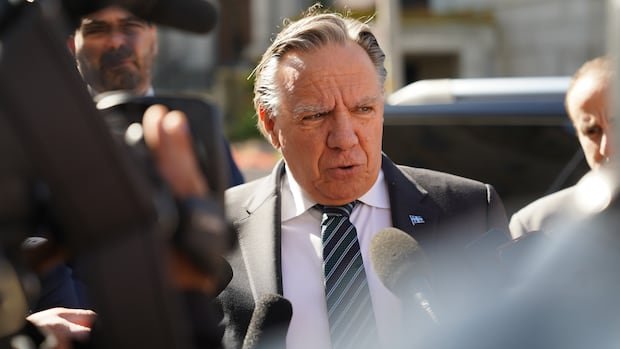The initiative was launched by Alberta Senator Scott Tannas. In May 2024, he sent a message to his colleagues in the upper camera inviting them to what he called a “familiarization tour” of his province.
The idea was simple, he explained. Many senators were not familiar with their part of the country and would benefit from a visit to meet Alberta.
The trip, organized in collaboration with the Alberta government, had several stops, including a visit to Calgary Stampede, a meeting with members of the tourism industry at Banff, a one -day trip to the oil sands and a tour of the grains and beef farms of the province.
Fifteen senators chose to participate in the three -day trip last July. Six of them brought the staff and three senators brought their spouses. Taxpayers put into account the bill, which is within the rules of the Senate.
The total cost: $ 118,000, according to the data obtained and compiled by radio-channel.
Speaking with the condition that they are not named for fear of reprisals, three senators say they were restless about the idea. The senators, who did not attend, criticized the moment of the trip, but also their relevance. He was not linked to the specific work of the committee, and one said it was similar to “a summer team construction trip.”
After last year’s trip, other senators have organized discovery visits for this summer. One is planned again in Alberta, once again during the stampede, and another for Churchill, man.
The Senate Permanent Committee on the internal economy, budgets and administration (CIBA) is underway to determine if the “familiarization tours in Canada” must be better supervised.

“[The] The Steering Committee has questions and concerns about the organization of travel coordinated by groups of senators … [with] Expenses that differ considerably from the regular use of the Senate resources, “wrote Senator Lucie Monction in a letter to all senators on April 30.
Monco presides over the CIBA, as well as its Steering Committee of Agenda and Procedure.
“The Steering Committee wishes to ensure that public funds continue to be used diligently and prudently,” he wrote.
After a meeting behind closed doors last Thursday, the CIBA requested the subcommittee on Senate estimates and Committee Budgets (SEB) to examine and report on the coordinated trips by the senators, and issue recommendations to regulate it better.
Conjugal trips questioned
The other source of restlessness refers to the presence of spouses, whose trip to Alberta was reimbursed by the Senate.
“I am in favor of helping the senators see their families and sometimes pay the spouses to travel with us to Ottawa,” said a senator. “But it can’t be a free pass to pay a vacation in the rocky mountains.”
In an audit carried out in 2015, when the Senate was dealing with an expense scandal, the former Judge of the Supreme Court, Ian Binnie, issued a warning to those who sit in the Red Chamber: the spouses have the right to accompany the senators in the service, but their purpose is to allow the Senate administration to refer to the “family reunion”.
“The conjugal trip was never simply a non -taxable benefit or a walker basket in free airplanes,” he wrote.

That is precisely what bothers Senator Pierre Moreau, a former Quebec minister, who did not participate in the last summer tour. Although he feels that such trips can be beneficial and justified, he believes that the rules around marital trips should be tight.
“The spouses should cover their own expenses,” he said. “[Otherwise]I have a problem with that. “
None of the three senators that brought their spouses, Paul Prosper, Rosemary Moodie and Mouse Omidvar, responded to the requests for Radio-Canada comments.

Omidvar retired a few months after the tour.
In a September 2024 speech to the Senate, he told “a truly transformative visit to Alberta”, added that he bought his first pair of blue jeans during the visit to Calgary’s stampede.
“They are not my style, I think you know it, but I rewarded myself widely for several jeans that gave me a hat and they told me: ‘Hello, ma’am,’ as in the westerns,” he said.
Organizers defend the relevance of the trip
Tannas, who organized the tour, told Radio-Canadá in an interview that believes that participants can decide whether it is reasonable to bring their spouses.
“It depends on the individual senator, and they have to defend it,” he said.
Tannas defends to invite his colleagues to the stampede, an event that he considers important to understand the “spirit” of Alberta.
“The stampede, between the agricultural exhibition and, frankly, the Chuckwagon races and the show of the night, gives you a good sense of what Alberta is about and what the Western provinces are discussed.”
He also pointed out that Chuckwagon races were “at the end of the day”, and that the participants paid their entry rates.
However, its hotel of more than $ 500, at the most expensive time of the year, was reimbursed by taxpayers.
Tannas rejects the idea that he invented a vacation on the back of the taxpayers, saying that the program had a heavy schedule and multiple meetings.
He said that it is essential for senators to have a good understanding of the different regions of the country, because that is their work.
“Our work is to ensure that a region of the country is not being advantage over another,” he said, adding that last year there were several bills of private members in the Senate that saw so hostile to his province.

Senator Daryl Fridhandler, who is organizing the Alberta tour this summer, agrees.
“Yes, it will cost some money. But, you know, you get what you pay. And you will get better senators and better decisions if people better understand things.”
Some say that the rules need to harden
Like Parliament members, 105 senators can be reimbursed by trips related to their parliamentary work. Everyone has a free travel bank from their homes to the Senate in Ottawa.
Senators can also use some of their “special” trips, such as attending conferences, language training or meetings representatives in a region.
But the rules are clear: “At all times, the main purpose of the trip will be related to a parliamentary function and travel expenses will be justifiable, appropriate, reasonable and well documented.”
In an interview with Radio-Canada, the new Democratic deputy Alexandre Boulerice said he believes that senators should be more prudent in their expenses, especially because public servants have seen their reduced travel budgets since 2023.
“I think there is poor management of public funds there,” he said. “And I think we should adjust the rules.”
Boulerice said that senators can now organize trips throughout Canada under the pretext that there are different “corners of the country” that they need to understand.
He pointed out that since the trip was not part of the work of the Senate Committee, there is no expectation of a study or report with recommendations.
“If we can do that, I’m going to make a familiarization trip to Baie-Des-Chaleurs in New Brunswick with my family. However, I’m not sure the taxpayer benefits,” he said.
The political scientist of the University of Ottawa, Gineviève Tellier, who specializes in public finances, agrees.
“It seems to me to go a little beyond the normal reach of senators’ work,” he said. “Now, if the Senate says: ‘We want to work on a particular issue (oil, energy, fishing, etc., and we need some help, and we need to go there,’ well, there is already a procedure, there are funds.
“But this type of trip, on the initiative of a single senator, without responsibility later, what is the point, apart from raising awareness?” She said.

The leader of the Bloc Québécois representatives, Christine Normandin, pointed out the composition of the provincial representation of the Senate’s characteristics to ensure that all parts of the country are heard.
“There are Alberta senators! They are supposed to be Alberta’s voice in the Caucus of the various senators,” he said in an interview.
The concern for three senators who spoke with Radio-Canadá is that the tours leave a frivolity impression, which is badly reflected in the Senate as a whole.
“This trip can be useful, but it is not essential,” said a senator. “When you are an un chosen official, you must be particularly careful with public spending. You can’t let things get out of control.”
A dozen years ago, the Senate was tarnished for its expense scandal that involved housing and trip assignments claimed by conservative and liberal senators.
Since then, spending rules have been clenched: senators must be more transparent, but Tellier advises senators, especially those who did not experience the scandal, are extremely cautious.
“The relevance of the Senate is constantly questioned,” he said.








